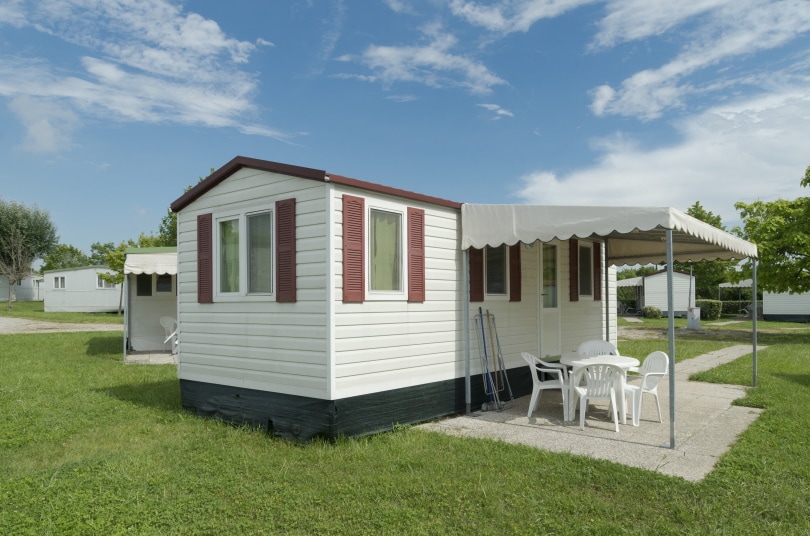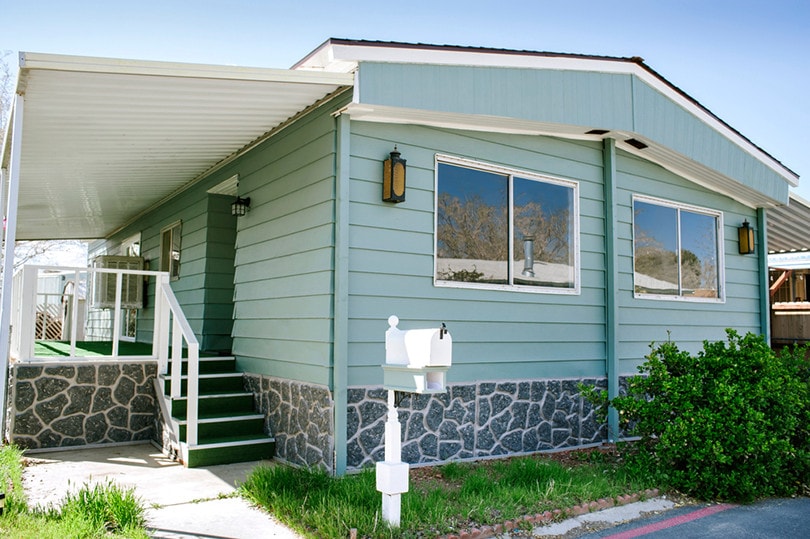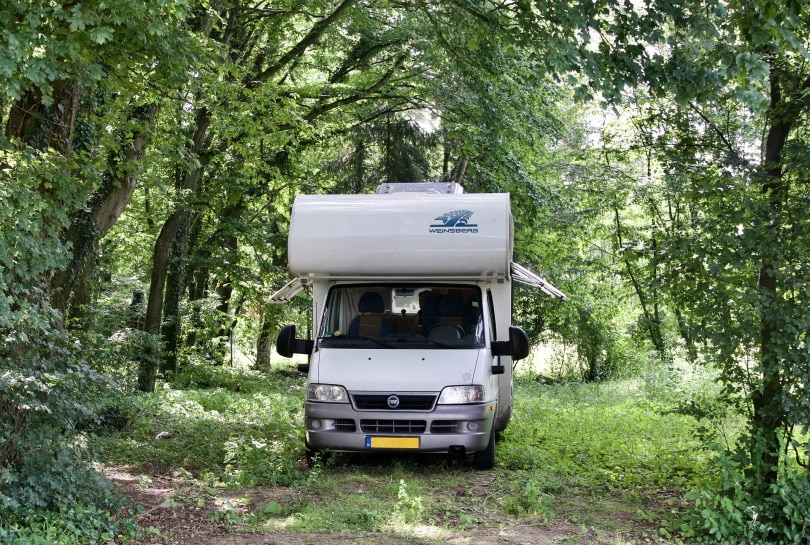How Much Does It Cost to Move a Mobile Home? Facts & FAQ
-
Pete Ortiz
- Last updated:

Mobile homes are named for their ability to be transported. Mobile homes are able to be hoisted off their foundations, loaded onto a truck, and driven for miles before being unloaded in a new location. This unique feature of mobile homes has a lot of interesting benefits, but how much does it cost to move a mobile home? Most people don’t think about the cost until they are getting ready to move, and that can be a mistake because, depending on your individual situation, the prices can be substantial.
Here is how much it costs to move a mobile home this year, including typical prices for all sizes of mobile homes, average costs for different services, additional costs that could be lurking in the wings, and factors to consider that could cause your costs to spike.
Mobile Home Moving Costs

The final cost of moving a mobile home depends on many different factors. Prices can range anywhere from $1,000 to $20,000 or more, depending on the type of mobile home and the distances that need to be covered. Most transport companies can comfortably move a mobile home between 60 and 100 miles without running into too many issues, but if you need to go further than 100 miles, the costs can mount quickly.
There are also different services to choose from. You can book a transport only job, which is the cheapest option. Transport only costs cover the loading and transportation of the mobile home, but it does not cover the cost of the preparations, necessary adjustments, or disconnecting the home from the utilities. If you are confident, you can prepare the mobile home yourself and can save some money by buying just the transportation.
Transport Only Costs (>60 Miles)
| Low End | High End | Average | |
| Single Wide | $700 | $1,100 | $900 |
| Double Wide | $2,000 | $2,500 | $2,250 |
| Triple Wide | $2,500 | $3,500 | $3,000 |
Not everyone is comfortable trying to get their home prepped to move. Disconnecting and reconnecting the mobile home can be a tough job that requires a professional. Full-service transport packages include disconnect, reconnect, basic preparation, and inspections to ensure that everything is taken care of in one single trip. Full-service packages cost considerably more than transport only packages, but they also include a lot more.
The average prices for full-service transportation run three to four times more than transport only services.
Full-Service Transport
| Low End | High End | Average | |
| Single Wide | $3,000 | $5,000 | $4,000 |
| Double Wide | $4,000 | $10,000 | $7,000 |
| Triple Wide | $10,000 | $15,000 | $12,500 |
Most companies have stipulations that cover the first 60 to 100 miles, but after that, additional fees start getting added for longer trips. Most people opt not to move their mobile homes very far because the costs can jump considerably to the point where it is cheaper to sell your old home, save the costs on moving long distances and buy a new mobile home in a new state. After 100 miles, costs to keep your mobile home on the road can run anywhere from $4 to $8 per mile. That means if you need to pay additional mileage for a truck and pilot, you could be shelling out an additional $4,000 for a 500-mile trip.
Average Costs Per Mile
| Truck and Trailer | $4.00 – $6.00 |
| Pilot Car | $1.50 – $2.00 |
Costs can vary quite a bit depending on the size of the mobile home and the distances that need to be covered. If you just need a short transport for a disconnected home, you could pay as little as $900 for a simple trip. If you need a full-service move across state lines, you could be easily looking at $10,000 or more.

Additional Costs
- $100 – $1500
Moving a mobile home is serious business. The machinery involved is large and heavy. The people involved are trained, specialized professionals. All of that often requires permits. Large trucks hauling mobile homes require permits to be on the roads. Some states require permits and inspections to be completed when the truck crosses a state line.
Some regulations require the use of a spotter and or pilot truck to guide the large truck along the road, and those drivers also require permits. The transportation company will usually take care of the paperwork for all of the permits required but permits always constitute additional fees. The longer the drive, the more states that you drive through, and the larger the vehicle, the more permits that will be required.
- $50 – $250
Depending on your local codes and the areas you are moving in and out of, you will likely require at least one inspection. Some states require mobile homes to be inspected upon installation. Some transport companies will require a simple inspection of the home before they will agree to transport it.
Some mobile home parks will require an inspection of the site after you move to ensure that everything is up to code and good to go. Depending on the state, county or city that you are moving to, you could be on the hook for a couple of hundred dollars or more in inspection fees or new taxes relating to the transport of your mobile home.
- $500 – $3000
Unless you are an electrician, a plumber, and an inspector all rolled into one, you are likely going to have to pay someone to come and disconnect your mobile home. Mobile homes are usually tied into the local power grid and have their own sewer and water. Whether that be a septic system and well or city water, someone is going to have to safely disconnect all of the fittings to get the mobile home ready to travel.
You will also need to get the home reconnected on the other side. Some transport companies will include these services in their initial estimate, but it costs more. Check the fine print of your estimate to see if they are including any upcharge for disconnecting and prepping the mobile home. If not, you are going to have to find someone to come and disconnect the power and water and someone to reconnect it on the other side.
- Variable
In order to move your mobile home, you will likely need to pay for insurance for the trip. The transport company is required to carry their own insurance, but their insurance might not protect you and your things. Check with your insurance company and look into buying insurance for the trip. You need to make sure that your home, your items, and your assets are protected in the event of an accident.
If your home comes off the trailer and smashes to bits, you do not want to lose everything and be the subject of a lawsuit. Sometimes mobile home insurance also covers transportation but not always. Sometimes the policy only covers the initial transport and not any subsequent trips. You may be required to update your policy or pay an additional fee to the transporter to make sure that all of your stuff is covered during the move.

- $25 – $300
Usually, the movers will bring everything they need to transport your mobile home but not always. If you are keeping certain items inside the trailer, you might need to secure them using straps or protective wrap. There might need to be some alterations made to the outside of the trailer to get it ready for transport to prevent doors and windows from opening or siding from coming off.
You might require some supplies and basic tools before and after the move to make sure everything goes smoothly. These small things can add up if you are not prepared. Plan on having some extra stuff on hand to secure your items and the trailer during the loading process, just in case.
- Variable
Sometimes in order to move your mobile home, you will need to conduct repairs in order to get the job scheduled. Many movers will not take mobile homes in bad repair. Certain things like the base, the structural integrity, the roof, and the doors and windows often need to be in good shape before a professional will move the mobile home.
Sometimes repairs can be as simple as securing some loose paneling around the skirt, and other times it might require serious work on critical components of the house. The extent of any proposed repairs will usually come up during the inspection.
 The Status of Your Mobile Home Can Greatly Affect the Price
The Status of Your Mobile Home Can Greatly Affect the Price
Age & Condition
The age and condition of the mobile home are important factors in determining the final price. Older homes or homes that are in poor condition will command a higher price than newer mobile homes in good condition. Older homes have more risk of damage during transport which increases the liability and risk for the carrier. It can also require stops during travel, guide cars, and other additional expenses to be added on in order to ensure that the aging mobile home arrives at its destination in one piece.
Size
There are a variety of different sizes of mobile homes, including single-wide, double-wide, and triple-wide variations. The larger the mobile home, the more expensive it is to transport. Larger mobile homes require a larger truck. Oversized loads require special drivers, permits, and guide cars to ensure that the load meets all local requirements. Single-wide mobile homes are the easiest type to transport, and the difficulty goes up with each subsequent size. If you have a double-wide or triple-wide mobile home, expect to pay considerably more than someone with a single-wide mobile home.

Weight
The more weight a mobile home has, the more expensive it will be to transport. Weight usually coincides with the size of the mobile home but not always. Some mobile homes have more robust construction and different foundation types that can add or subtract weight. The amount of furniture being hauled inside the home (if any) can also add to the overall weight. The heavier the home is, the more money it will cost. Heavier trucks are taxed more, and certain weight mobile homes require additional permits and inspections before they can roll.
Cheapest and Most Expensive Moves
The cheapest type of mobile home to move is a new single wide home that has to travel less than 60 miles. The most expensive move would be a large and heavy mobile home that is worn out or more than 15 years old that has to travel over 100 miles. The cheapest mobile home moves can be made for $2500 or less, while the most expensive moves can cost over $20,000 depending on the situation.
 Conclusion
Conclusion
Moving a mobile home can be a quick and affordable job or it can be an expensive slog. The size, distance, age, permits required, and services needed on either end can greatly affect the price. Some jobs are as simple as moving an empty disconnected mobile home across town for a few hundred dollars while other jobs require a mountain of paperwork, overtime miles, oversized load drivers, inspections, and more. The largest jobs can cost nearly $20,000. Figuring out what factors your mobile home has that could affect the price is key to coming up with a realistic estimate for your moving job. Do not be surprised by high prices and start evaluating your mobile home today.
Featured Image Credit: hans engbers, Shutterstock
Contents


